#Inspector Fleet
Text

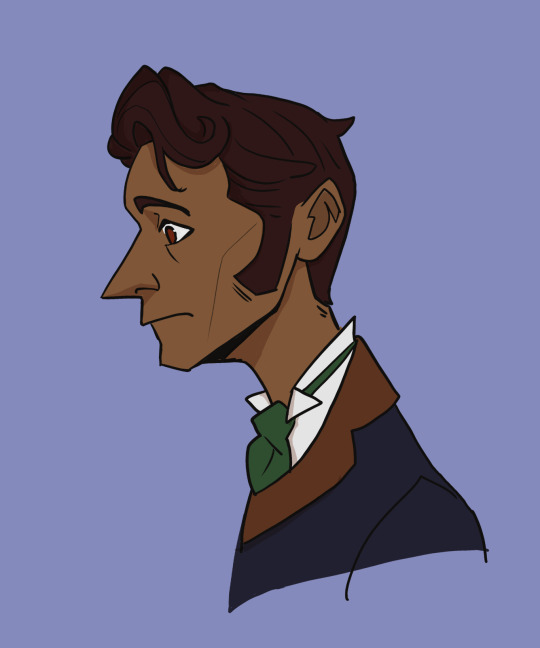
some expression practice with inspector fleet!!
#victoriocity#victoriocity podcast#inspector fleet#archibald fleet#i wanted to see how consistent i could keep him while drawing at different angles bc i am. not the greatest at that#i love him so much. funny little man#i changed his nose a little bit from my previous design bc i think he has a big pointy nose vibe#does that make sense? no. but that's fine#OH also i've decided to keep fleet's false right eye with the slightly different color (based off of coelart's design!!)#bc its cool as hell and i love it#art#my art#weaverofink
72 notes
·
View notes
Text
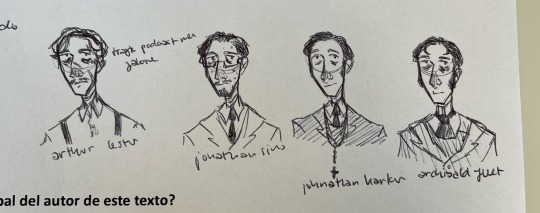
Soft launching my art by showing you guys some shitty doodles of my favourite (podcast) blorbos that I drew while in class.
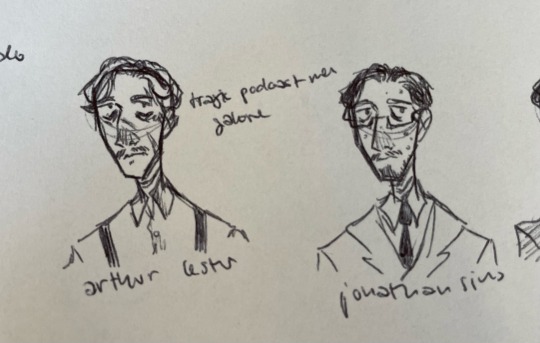

#ignore the same face syndrome I’m working on it#arthur lester#malevolent#malevolent fanart#Jonathan sims#tma#tma fanart#jonathan harker#dracula daily#re: dracula#victoriocity#archibald fleet#inspector fleet#my art
51 notes
·
View notes
Text
Thinking about the protective way Clara tells Fleet not to go into DeVries' dangerous-looking training set-up, and about how when Septimus mentions Fleet's friend Fleet's immediate assumption is that he must mean Clara, and about "This is Miss Clara Entwhistle, my partner - in business, my business partner." / "I'm also his friend, but he doesn't like to say it.", and about how Fleet rarely smiles but he smiles to himself at Clara having a good idea (and Clara notices the change in his expression), and about how Clara is trying to work out Fleet's birthday through a process of elimination, and about how Fleet tries twice to shut down the conversation with Frances Byrne that's making Clara uncomfortable, and about how panicked and angry he sounds after realising she's been poisoned...
#Victoriocity#Victoriocity spoilers#The nice thing about this season (and about the book) is that - although we don't know the exact time skip between seasons -#we're now getting to see their dynamic after they've known each other#(and worked together) for longer than a couple of weeks#I love how quickly they are ride or die in s1#but I love that there's more history there now. a more developed bond#You can hear it in little things#like how Fleet knows before she does it#that Clara is going to ask a person who is going to jail thanks to them#to recommend their PI business#the way he says 'Clara no...'#but then gets on board with it#Oh also I like to think that moment in S3E4 isn't the first time Fleet has smiled to himself at Clara doing something smart#but usually he does it while Clara isn't watching#This is all platonic to me btw#I'm open to being contradicted by the source material#but for now that's important to me#They are friends <3 even if he doesn't like to say it#Clara Entwhistle#Archibald Fleet#Inspector Fleet
50 notes
·
View notes
Text

I think Fleet should get to be a lil’ inhuman and scary sometimes. As a treat.
#victoriocity#victoriocity fanart#victoriocity spoilers#kind of? At least for the end of season 1#inspector archibald fleet#inspector fleet#clara entwhistle
48 notes
·
View notes
Text
Fleet truly is the funniest motherfucker out there, and this season of Victoriocity has actually made me laugh out loud multiple time, I'm having the time of my life over here
25 notes
·
View notes
Text
Why doesn't Inspector Fleet carry a gun? Just saying he gets kidnapped a LOT.
13 notes
·
View notes
Text





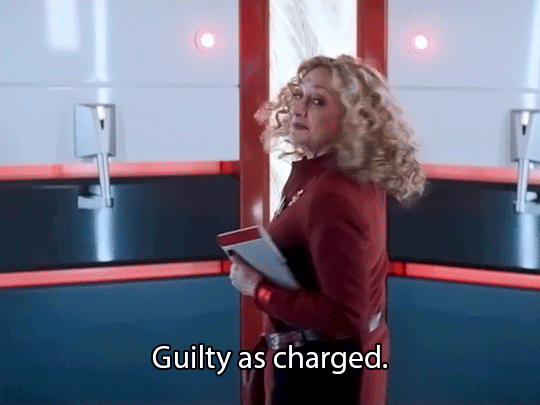
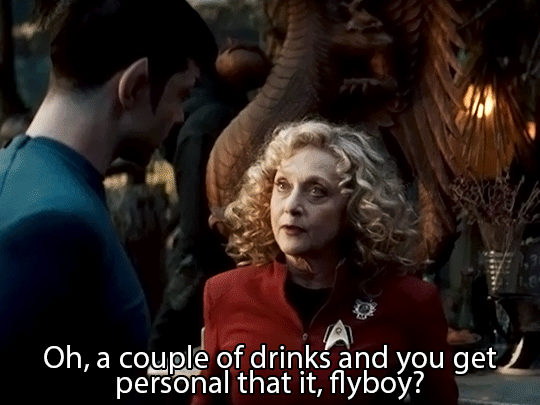

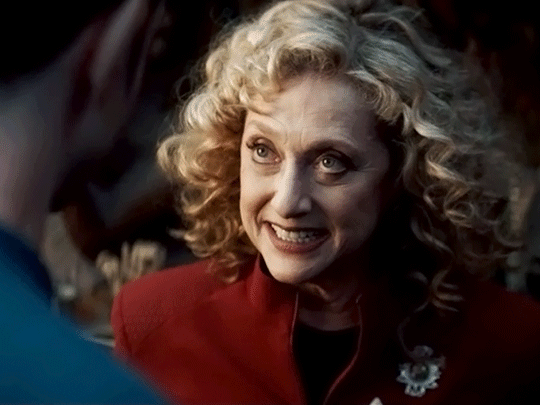



Commander Pelia
Star Trek: Strange New Worlds - The Broken Circle
#Cmdr. Pelia#Carol Kane#Star Trek: Strange New Worlds#Pelia#chief engineer pelia#Star Trek SNW#Star Trek#SNW#Chief Fleet Inspector Commander Pelia#Star Trek Babes#stedits#my gifs#tv : Star Trek#Star Trek SNW Episodes#The Broken Circle#Spoilers#Star Trek Spoilers#Star Trek Strange New Worlds Spoilers#I Love you Carol Kane!#That Carol Kane Laugh!#💗💗💗#I Love her so much already!
121 notes
·
View notes
Note
I feel like I missed something, what's Victoriocity?
It's a podcast! It's a detective comedy set in 1887, in a steampunk-esque alternate history where London has expanded to cover the entire south of England.
The main characters are Inspector Fleet, a man who just wants to do his job and stay alive, and Clara Entwhistle, a crime journalist who is determined to help whether Fleet wants her to or not. The first two seasons are self-contained and only 6-7 episodes, so it's not much of a time commitment, and the third season is currently airing.
It's very good, VERY funny, and I highly recommend it!
#i was about to make a joke about my constant evangelizing along the lines of 'have you met our lord and savior inspector fleet'#and then i remembered that he literally does have a cult following in canon. incredible podcast#victoriocity
13 notes
·
View notes
Text
Sengoku
Happy Birthday
May 9

6 notes
·
View notes
Text
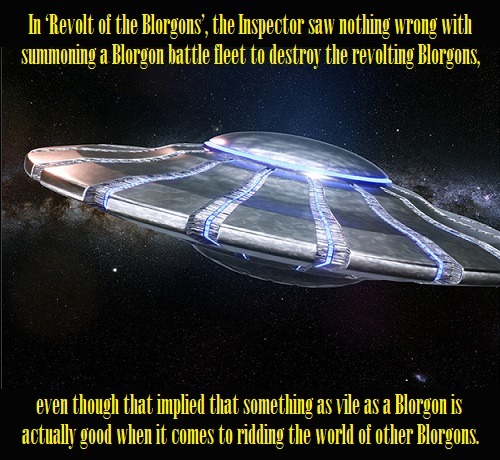
In ‘Revolt of the Blorgons’, the Inspector saw nothing wrong with summoning a Blorgon battle fleet to destroy the revolting Blorgons,
even though that implied that something as vile as a Blorgon is actually good when it comes to ridding the world of other Blorgons.
#Inspector Spacetime#Unfortunate Implications (trope)#Unfortunate Implications#Revolt of the Blorgons (special)#the Inspector (character)#saw nothing wrong with#summoning a Blorgon battle fleet#to destroy#revolting Blorgons#bad Blorgons#Blorgons#implied something as vile as a Blorgon#is actually good#when it comes to#ridding the world of Blorgons
0 notes
Text
I doodled fleet making a judgemental face on a post it note and stuck it on my wall but I didn't realize it was right at eye level so every time I do anything he's just staring at me like I've personally offended him
#i keep making eye contact lmaooo why did i put it there#victoriocity#inspector fleet#i mean. its in character but i dont need him judging me for scrolling on my phone while im supposed to be working
28 notes
·
View notes
Text
Inspector Archibald Fleet spends all of his time begging Even Greater London & the denizens of it to make sense despite the fact that they're the least sensible things ever, and that's one of my favorite things about him. he has personally decided to be the whole city's straight man with a thinly veiled anger
#he & juno steel need to meet up for the 'none of this makes any fucking sense why is this my life' convention#victoriocity#toby speaks
94 notes
·
View notes
Text
“This has both our names on it”: Viewing Fleet and Clara’s relationship in Victoriocity through a queerplatonic lens
TL;DR: By Season 3 of Victoriocity, Fleet and Clara have developed a committed emotional partnership that certainly moves beyond the purely professional. Whilst very much operating as a duo, they can be interpreted as often rejecting or subverting romance-coded elements in their relationship, instead embracing a unique dynamic that can be read as resonating with the concept of a queerplatonic relationship (QPR).
Buckle up because this is over 2,500 words long! If you'd rather read it as a document, you can access it here: Fleet & Clara QPR Google Doc
Disclaimer: I'm not making any claims about creator intent, nor about how anyone else ought to interpret Fleet and Clara's dynamic. It's also worth acknowledging that queerplatonic relationships are inherently defined by the people in them and any attempt to apply such terminology to a story set in 1887 is obviously anachronistic (although whether that should matter when said story also contains a cyborg Queen Victoria is up for debate).
With that said, if we define a QPR as a committed personal partnership which is not entirely captured by the typical expectations of either friendship or romance but may contain some elements typically associated with either (other definitions of QPRs are available), I enjoy viewing Fleet and Clara's relationship through a QPR lens, and I want to talk about some of the reasons why I think this reading works.
***Spoilers for all three seasons of Victoriocity and the novel High Vaultage***
Detective duos
Even before we actually get into Fleet and Clara's particular bond, detective / crime-solving duos as a general concept have QPR energy to me (which probably predisposed me to this interpretation). It's the Holmes-and-Watson legacy. It's the use of the word 'partner' in a non-romantic context (‘associate’ or ‘companion’ can also serve a similar purpose). It's the intense trust and reliance on each other. It's the sense of being a recognisable pair, always appearing together, known as a duo, with skills and attributes that complement each other.
Romantic assumptions
Moving on to Fleet and Clara specifically, one aspect of their relationship that can be read through a QPR lens is how they are often in situations where other people believe or imply that there is a romantic relationship between them. Sometimes this is a deliberate strategy of theirs, and sometimes it’s imposed upon them by others. But I’d argue that there’s never a point where they both simultaneously seem entirely comfortable with that romantic narrative for their relationship. Usually one of them will actively deny the assumption or react negatively to the implication:
When Mrs Hampshire interprets Clara and Fleet as a couple experiencing “young love”, Clara might be happy to adopt this as an effective cover story, but Fleet seems unsettled and keen for them not to be perceived this way: “No. No. You’ve misunderstood, we are not, that is to say I am…” (S1E2)
When Warden Hughes assumes Fleet is the new Warden and Clara is the new Warden’s wife, Clara says “I am certainly not”, with emphasis on the ‘certainly’. (S2E2)
Fleet definitely doesn’t sound enthused when he realises Clara has gone for a married couple as their cover story at the Grand Salcombe: “I am sure I’ll regret asking, but by any chance am I [Mr. Theasby?]” (S2E2)
When Titus Byrne tells the pair “I take it you're happy sharing [a room]”, Clara responds with a horrified “What?” (S3E4) (Obviously sleeping in the same room isn’t inherently romantic, but it is often perceived that way.)
Of course, fake dating and external assumptions of romance are very common tropes in romantic will-they-won't-they dynamics, and these moments could definitely be interpreted that way for Fleet and Clara. But I prefer to read these instances as reflecting a different kind of closeness between these two characters. They have a sense of emotional partnership that allows a marriage cover story to seem plausible to others and that other people sometimes automatically assume to be romantic (obviously with some period-typical heteronormativity at play). But to me, it doesn't seem like either of them are fully comfortable with their relationship being perceived in a directly romantic way. Perhaps they are a couple in a different sense…
Proposal via door plate
The way that Fleet asks Clara to be his business partner has always seemed to me like a platonic version of when people find personal ways to surprise their romantic partner with a proposal:
CLARA: You bought me a door plate for your office? [...] This has both our names on it.
FLEET: What do you think?
CLARA: I like it. (S2E7)
Fleet could have just asked Clara outright, without going to the trouble of buying a sign that would have been useless if she’d said no. If it was purely a professional business proposition with no emotional meaning behind it, I think he would have just asked verbally. But instead, he gifts her a sign with their two names paired together: Fleet-Entwhistle Investigations. There's something so intimate about that to me: about Fleet asking Clara whether she would like to be a duo with him in a more formally-defined but still non-romantic way; about him choosing to present this offer in the form of a gift; about the way he presents her with their two names joined together etched into metal and asks what she thinks; about the significance that this gesture attaches to their partnership; about him having enough trust that she'll say yes that the effort and vulnerability of presenting her with that sign seem worth it for him. And the gesture means an awful lot to Clara:
She thought about the door plaque he’d had engraved with both their names on it as his way of inviting her to be his business partner – typical Fleet, refusing to tell her so much as his favourite breakfast food and then to go and do something like that. It was the nicest thing anyone had ever done for her. (High Vaultage, p187).
Anniversaries
In the special episode ‘Murder in the Pharaoh's Tomb', Clara says “And you know what else is a big occasion Fleet? It's our one-month anniversary.” She wants to celebrate the anniversary of Fleet-Entwhistle Investigations. Their partnership holds a significance for her that means key dates associated with it are worth remembering and remarking upon.
When Clara first mentions their anniversary, Fleet nearly chokes on his drink, which seems like an instinctive reaction to the usually romantic connotations of an anniversary (see my point above about Fleet not being comfortable with their dynamic being perceived as romantic). But when Clara clarifies what she means, Fleet seems much more cheerful about the notion of their anniversary: “Ah, so it has.”
“Miss Clara Entwhistle, my partner”
I get extremely strong QPR vibes from this moment, when Fleet introduces Clara to the sailors at Grave End:
FLEET: This is Miss Clara Entwhistle, my partner - in business, my business partner.
CLARA: I'm also his friend, but he doesn't like to say it. (S3 E3)
Fleet and Clara are partners, but not in the way the average person might assume from that word, which Fleet realises mid-sentence here. This is another instance of Fleet reacting negatively to the idea that their relationship might be interpreted romantically (see above). And yet, 'partner' (rather than, say, ‘colleague’) is the word that comes naturally to him in this moment to describe who Clara is to him. He then frantically emphasises the professional element of their relationship so as to avoid the romantic implication, but Clara is keen to proudly assert that there is a personal, emotional aspect to their dynamic too. They are first-and-foremost partners, and they are friends, and they do not want to be seen in a romantic light - this post basically writes itself...
“Her ridiculous detective.”
When Clara fears for her life at the display of the Lanterns, the narration tells us:
“she thought of her brother, her sister, her parents... Her ridiculous detective.” (High Vaultage, p172)
The fact that Clara thinks of Fleet in this moment of fear clearly indicates his importance to her, but I think the phrasing of this quote is particularly interesting. The narration lists Clara's immediate family: two of whom are dead (her sister and father), one of whom is publically mourning Clara's life choices (her mother), and only one of whom we have any real evidence of her having a positive relationship with (her brother). And then, separated from these complicated familial relationships by an ellipsis, the narration tells Clara also thinks of Fleet, “her ridiculous detective”.
Parents and siblings are familial relationships that tend to come with established expectations, in which the use of a possessive pronoun (i.e. her brother) to indicate the relationship is a norm. ‘Detective’ does not fall into this category; unlike ‘brother’, ‘sister’, ‘parent’, ‘friend’, ‘partner’ etc., ‘detective’ is not a word that inherently implies a relationship or that we'd usually expect to see preceded by a possessive pronoun. The idea of ‘her detective’ therefore stands out, giving the sense that there is a unique relationship being indicated here. The way in which Fleet is ‘hers’ is something that Clara has chosen for herself, something that they have shaped together. Who they are to each other can't necessarily be fully expressed using standard phrases that traditionally describe relationships between people. But Fleet is Clara's detective, of which she only has one, and who she'll think of in the midst of “the screaming of the heavens at the end of the world”.
Fleet is also the only one in this list of Clara's loved ones who gets an adjective - her love for him has detail. And while “ridiculous” might often be perceived as negative (it's certainly not a classic romantic endearment), it seems to me like there's such fondness in it in this context: the recognition of and affection for eccentricities, the idea that his importance to her is not (purely) based on his professional strengths but on Fleet as a whole - perhaps at times ridiculous - person.
“Settled”
When Clara and Fleet talk about Clara's mother’s expectations for her, they have this exchange:
"She's still living in hope that one day I'll settle down."
"You're not settled?" asked Fleet.
"I am." (High Vaultage, p259)
By ‘settle down’, Clara's mother of course means ‘marry’, ideally into “at least a minor baronetcy”. But Clara already considers herself "settled", just not in a way her mother would understand or appreciate. She's not looking to "settle down" into a lifestyle other than her current one. She is settled in a situation where Fleet is certainly her closest personal connection in London (and perhaps anywhere), and where the two of them work closely together, operate as a duo, and then go back to their separate homes. And this partnership with Fleet is a comfortable set-up that feels right for Clara exactly as it is, rather than being a precursor to, or a distraction from, the marriage ambitions that her mother wants for her.
I think this exchange also contains an implicit sense of the commitment between the two of them. Fleet wants to check that Clara is ‘settled’ in her current situation, of which working closely - and platonically - with Fleet is obviously a major element; Clara confirms she is. There's a subtle indication of their shared intention to be in this for the long haul.
As a sidenote, Fleet and Clara’s implicit assumption that their partnership is a long-term one can manifest itself in joking contexts as well as serious ones. Look at this exchange from S3E5:
FLEET: We're not bandits, we're just going to flag it down.
CLARA: We'd be terrific bandits!
FLEET: Let's just see how our current line of work goes.
I think it’s notable that, in this joking speculation, both Fleet and Clara use ‘we’ and ‘our’. The joke could have been phrased just as effectively if they were imagining only Clara becoming a bandit. But the suggestion is that, if either of them was a bandit, they’d be bandits together. Even if they changed their lives entirely, they'd still approach life together.
Inseparable
Fleet and Clara have become a nearly inseparable duo in a way which is noticed by others. For example, after Clara and Fleet fall out in High Vaultage, Fleet meets with Keller, who says:
"You're here with me instead of barrelling across town with her, so I'm just assuming there is some thickheaded puffinry for which you need to apologise to Miss Entwhistle" (p335)
Keller, hardly the most emotionally perceptive man in Even Greater London, automatically infers from the fact that Fleet is on his own that he has had a falling out with Clara, rather than that they just happen to be in different places. When all is well, Keller expects to see the two of them together, whether or not they are in a position to be actively working a case.
Going back earlier in their partnership, Keller makes a similar assumption about Fleet and Clara being inseparable in S2E6. When Clara shouts her name amidst Keller's anti-Vidoc booby traps, Keller asks "Entwhistle? Which means… Fleet?" Again, there's this idea that if one of them is there, the other is likely to be there too - they come as a pair. (It's worth noting that this scene takes place less than two weeks after they first met.)
“Like a friend might?”
At the end of S3E7, Fleet suggests that he and Clara go to the theatre together. It would have been easy for this invitation to have been explicitly framed as a romantic proposition, or even for the nature of the offer to have been left more ambiguous. But Clara says "Archibald Fleet, are you inviting me to a social activity? Like a friend might?" The use of the word 'friend' directly labels this as a platonic interaction. And it's with that platonic lens on it that Clara is extremely excited to spend non-work-related social time with Fleet.
“Maybe it'll just be my good luck charm.”
CLARA: My grandmother's ring, I don't suppose you managed to hold on to it? [...]
FLEET: Oh, it's been crushed.. I'm sorry Clara [...]
CLARA: No, you keep it.
FLEET: What? No...
CLARA: Keep it. Maybe it'll remind you not to run towards trains.
FLEET: Maybe. Maybe it'll just be my good luck charm.
In S3E7, Clara gives Fleet a ring, which - as a gift from one person to another - is traditionally a symbol of a particular, legally recognised, kind of personal commitment. But when Clara tells Fleet to keep the damaged ring, down in the Underground tunnels after the destruction of the beast and Fleet's latest brush with death, it is quite a different situation to a wedding or a proposal. A married man would traditionally wear his wedding ring on his finger for all to see, but Fleet won't ever wear this ring like that. The ring itself has been bent into a different shape between the wheels of their misadventures, subverting the usual associations of a ring given from one person to another. (In a heteronormative world, those associations are particularly strong when the two people in question are a woman and a man.)
That ring is not an engagement ring, but it is Clara’s grandmother's ring, an inheritance from the blood family she never really felt she belonged in, now given to the man who might be a very different kind of family for her in London. That ring - with which Clara saved Fleet's life - is a symbol of their bond. And it therefore serves as a reminder for Fleet “not to run towards trains" and as a “good luck charm”. I like to think he'll carry that ring with him, perhaps in his jacket pocket - a little piece of his partner, kept close to his ticking heart…
Thank you for reading all of this!
If you’ve read all of this, I'm assuming you also enjoy the concept of Fleet and Clara as a QPR (unless you're really a glutton for punishment) and that makes me very happy! This was long because there's so much to say about them… And I wrote all of the above without even getting into: the potential to headcanon Fleet and/or Clara as aspec (which I don't think is necessary for QPR headcanons, but which is also fun); Clara's baggage around and discomfort with marriage in general; the speed with which Fleet and Clara become a ride-or-die duo; and the many other demonstrations of care, understanding, trust, respect, and affection between them that didn't feel as directly QPR-coded to me but are nonetheless wonderful. Please do feel free to share your own thoughts!
#victoriocity#clara entwhistle#inspector fleet#archibald fleet#high vaultage#I'm not really trying to persuade anyone who doesn't already vibe with Fleet & Clara QPR as a concept#I just enjoy digging into that interpretation#I don't have any lived experience of QPRs myself#I'm just an aro who occasionally yearns#which tbf is probably the demographic most likely to obsessively interpret fictional duos as QPRs#I tried to avoid straying into anything like ‘they are too important to each other to be *just* friends’#when writing this#because I deeply dislike that outlook#That's not what I'm getting at here#Friends can be that important to each other without being in a QPR#I just think Fleet and Clara are important to each other in a particular way that can easily be read as a QPR or QPR-adjacent#Ngl for me personally I was very happy that there was no explicitly romantic Fleet and Clara moments#in S3 or High Vaultage#I’m sure I would still love their dynamic if they did explicitly take it down that route#I’m sure it would be done well#But the fact that Fleet and Clara are platonic (or at least ambiguous) means a lot to me personally#A related thought to that bit on romantic assumptions is that under amatonormativity#even the denial of romance/attraction is so often treated as evidence for it#which can mean that there's no way to escape that implication#so that's another reason why I enjoy taking characters at their word#when they express discomfort over a dynamic being interpreted as romantic#I finished writing this on Wednesday and I've been so impatient about waiting until S3 is fully out to post it lol
46 notes
·
View notes
Text
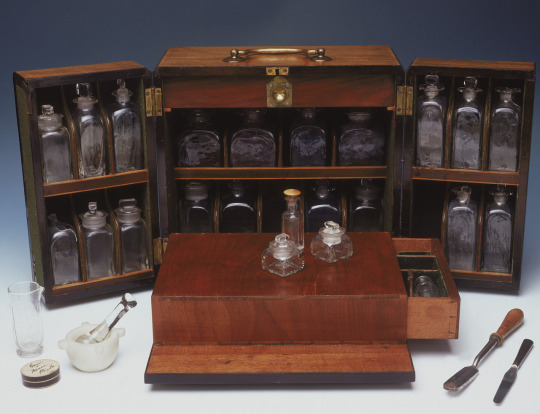
Naval Surgeon's medicine chest, belonging to surgeon Sir Benjamin F. Outram (1774-1856) and reputedly used at the battle of Copenhagen 1801
Outram was first employed in the naval medical service in 1794, and was promoted to the rank of surgeon in 1796. He served in HMS Harpy, HMS La Nymphe, and HMS Boadicea. He was surgeon in HMS Superb in the second battle of Algeciras, where Sir James Saumarez obtained a victory over the French and Spanish fleets on 12 July 1801. He received war medals and clasps for his services under Sir Richard Goodwin Keats. Then for a period he was surgeon to the royal yacht, HMS Royal Sovereign.
In 1806, with a view to private practice, Outram went to Edinburgh, and there graduated doctor of medicine on 24 June 1809. He was admitted a licentiate of the Royal College of Physicians of London on 16 April 1810, and then began as a physician at Hanover Square in London, where he lived more than 40 years. He acted as physician to the Welbeck Street Dispensary. On 3 May 1838 he was elected a fellow of the Royal Society; he also became an early member of the Royal Geographical Society.
In 1841 Outram became medical inspector of her Majesty's fleets and hospitals. He was appointed Knight Commander of the Order of the Bath (KCB) on 17 September 1850, and was admitted a fellow of the Royal College of Physicians on 9 July 1852. He died at Brighton on 16 February 1856, and was buried at Clifton, Bristol.
#naval history#naval artifacts#medicine chest#sir benjamin outram#battle of copenhagen#naval surgeon#early 19th century#age of sail#history
110 notes
·
View notes
Text
The day Princess Anne was almost kidnapped on The Mall — 50 years on
On this day 50 years ago, 23-year-old Princess Anne found herself fighting off a gunman as her bodyguard and driver lay wounded beside her. Emma Loffhagen takes a deep dive into the disturbing day one of the most senior royals was almost kidnapped.

By Emma Loffhagen
20 March 2024
“Your daughter has been kidnapped. The following are conditions to be fulfilled for release.”
In March 1974, Ian Ball used a rented typewriter to haphazardly type a letter intended for the then-head of state, Queen Elizabeth II.
Ball, 26, a funeral home worker, demanded £3 million — to be paid in £5 notes — in exchange for the return of the Queen’s daughter, Princess Anne.
After becoming fixated with the 23-year-old princess, he spent two years hatching an elaborate plan to kidnap her.
Today, March 20, marks the 50th anniversary of Ball’s kidnap attempt — one of the most bizarre and disturbing episodes in British royal history.

A “loner,” Ball had been inspired to hatch his elaborate kidnap plot by the novel Day of the Jackal.
He wanted to follow in the footsteps of the book’s hero, the contracted assassin the Jackal.
“He was a very strange man,” Ball’s neighbour later said. “The only time he ever went out was when he went down to the launderette or went out for some food.”
It was thought that he had developed a “fixation” on the royal, whipped up by the widespread and lavish coverage of her wedding to Captain Mark Phillips the previous year.
As part of his plan, Ball had moved from his run-down flat in Bayswater to a lush rented house in Fleet, Hampshire.
It was only a few miles from Sandhurst, where Anne lived with her then-husband Phillips.
After a quick phone call to the Buckingham Palace press office, Ball knew which engagements and events Anne attended each week.
He rented a car under the alias John Williams, stocking the boot with Valium tranquilisers and two pairs of handcuffs.
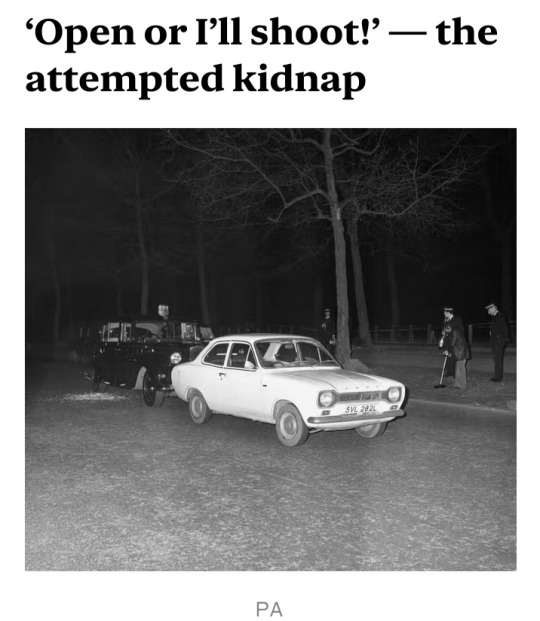
On the evening of 20 March 1974, Anne was travelling back to Buckingham Palace in an Austin Princess limousine.
She had attended a screening of Riding Towards Freedom, a documentary by the charity Riding for the Disabled.
Captain Phillips, her bodyguard James Beaton, and her lady-in-waiting Rowena Jane Brassey, were also in the car driven by royal chauffeur Alexander Callender.
At around 8pm, as the group drove up The Mall, a white Ford Escort swerved in front of the limousine, forcing Callender to stop.
Then a 31-year-old inspector, Beaton, who had been Anne’s bodyguard for a year, got out to investigate.
“I thought it was somebody who wanted to be a pain in the neck,” he later said. “There was no hint of what was to happen.”

Suddenly, a bearded man with light red hair jumped out of the vehicle and pulled out two handguns, smashing the passenger window with the butt of one.
Beaton had not even had the chance to pull out his weapon when he was shot in the shoulder.
He then attempted to fire back at Ball — but missed. Upon a second attempt, his gun — a Walther PPK — jammed.
Ball turned to the passenger door behind the driver’s seat and started shaking it. Anne was sat on the other side. “Open, or I’ll shoot!” he shouted.
As the princess and Captain Phillips desperately tried to hold the door closed, Anne’s lady-in-waiting crawled out of the door on the passenger side.
Beaton got back in the car, placing himself between the couple and their assailant.
Ball shot into the car, and Beaton’s hand deflected the bullet.
He shot the bodyguard a third time, hitting Beaton in the abdomen and causing him to fall from the vehicle.
“I felt tired and very drunk, although I hadn’t been drinking,” Beaton later told police. “I just wanted to lie down.”
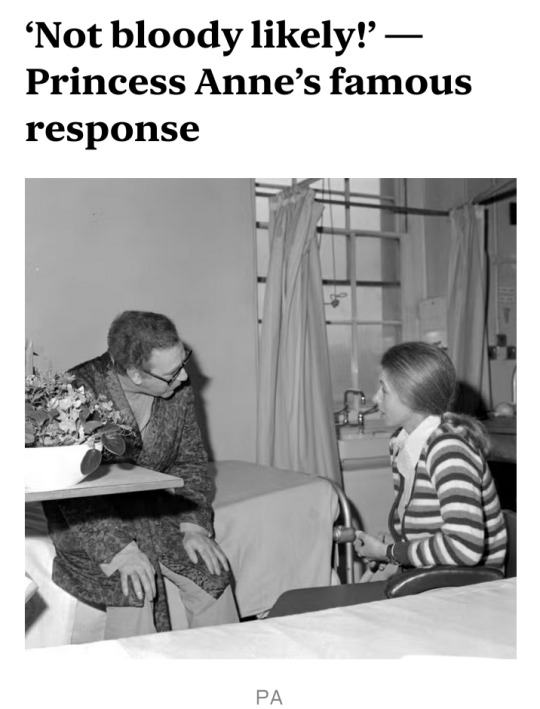
Callender stepped out to confront the gunman, but Ball shot him in the chest and he fell back into the car.
Pulling the door open, Ball grabbed Anne’s forearm as her husband held on to her waist.
“Please, come out,” Ball reportedly told the princess. “You’ve got to come.”
As the pair struggled over Anne, her dress ripped, splitting down the back, which she later recalled prompted her to “lose her rag.”
But, rather than panic, she had what she described as a “very irritating conversation” with her potential kidnapper.
Unbelievably calm despite the commotion, Anne famously replied: “Not bloody likely!”
In an interview with the late television presenter Michael Parkinson, she recalled:
“He [the gunman] opened the door and we had a discussion about where — or where not — we were going to go.
“I said I didn’t think I wanted to go. I was scrupulously polite because I thought it would be silly to be too rude at that stage.”
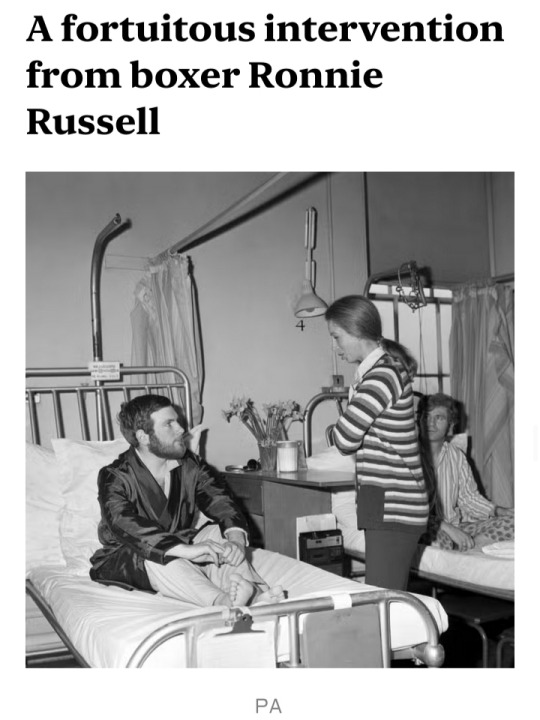
A nearby tabloid journalist, Brian McConnell, arrived on the scene.
Recognising the limo’s insignia, he realised the commotion must have involved a royal family member.
“Don’t be silly, old boy,” he told Ball. “Put the gun down.”
Ball responded by shooting him too and McConnell collapsed bleeding onto the road.
A man named Ronnie Russell drove past at this point.
He was on his way home to Strood, Kent, from working as an area manager for a cleaning company in London.
In a stroke of incredible luck, Russell happened to be a former boxer. He had cut his cloth at the Repton Club in east London, an infamous venue sponsored by the notorious Kray twins.
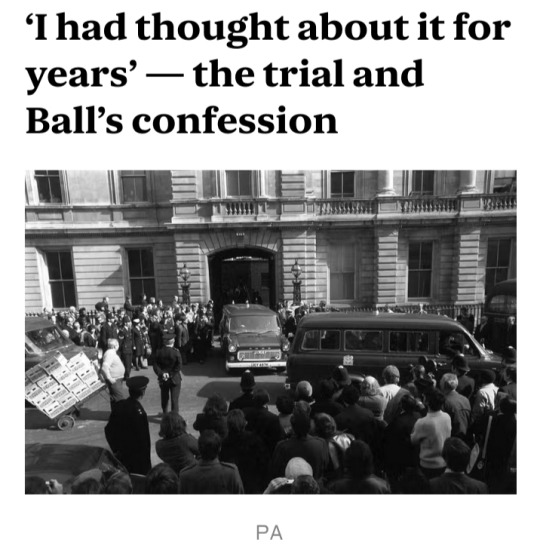
Jumping out of the car, Russell punched Ball twice in the head before leading Anne and her lady-in-waiting away from the attacker.
He later explained that he “did not like bullies,” which prompted his decision to intervene.
Despite being injured, Ball still shot the first police officer to arrive on the scene, Constable Michael Hills, 22, before running off.
Detective Constable Peter Edmonds, who answered Constable Hills’ radio request for backup, chased Ball down The Mall and through St James’s Park before tackling him on the ground.

At Ball’s Old Bailey trial in May 1974, more details came to light about the plot.
Ball kept his head lowered for most of the proceedings, only uttering the word “guilty” to confirm the charges of attempted murder and kidnapping.
In his pocket, detectives had discovered the kidnap note addressed to the Queen, which demanded the £3 million ransom (the equivalent of £26 million today), a free pardon, and a plane to fly him to Switzerland.
He had planned to take the princess to a central London property he had rented under an alias.
In a police interview, Ball also said he believed Anne would be an easy target after ascertaining her whereabouts by phoning the Buckingham Palace press office.
“I had thought about it for years,” he said. “She would have been the easiest. I have seen her riding with her husband.”
Ball also showed no remorse for having shot three men on the night of the attempted kidnap.
“They were getting in my way so I had to shoot them,” he said. “Well, the police, that's their job. They expect to be shot. I took a chance of getting shot so why shouldn't they?”
He added: “I suppose I’ll be locked up for the rest of my life. I am only sorry I frightened Princess Anne. There is one good thing coming out of this: you will have to improve on her protection.”
Ball was diagnosed with schizophrenia following the trial and sentenced to a mental health facility under the Mental Health Act, “without limit or time."
He remains in the Broadmoor Hospital in Berkshire to this day.
The facility has been home to a series of notorious criminals, including serial killer Peter Sutcliffe and London gangster Ronnie Kray.
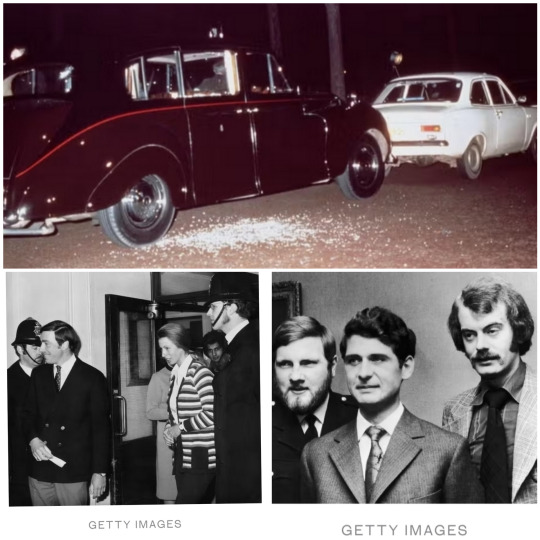
Immediately after the attack, the royals ceased having only one protection officer.
When Anne visited Beaton in hospital, “she turned up with two policemen,” her bodyguard said. “From then on, that’s what it was.”
“I had nothing…There was no back-up vehicle,” Beaton told The Times separately.
“The training was non-existent; but then again, [we thought] nothing was going to happen. They are highly specialised now, highly trained.”
Beaton continued to work for Anne for another five years — before the Queen employed him.
After Beaton’s weapon jammed, the type of guns used by bodyguards were also changed: “The Walthers were got rid of overnight.”
Beaton was honoured for his bravery, receiving the George Cross — the UK’s highest civilian honour for gallantry.
Russell also received the honour. In a 2006 interview, Russell recalled what Queen Elizabeth said as she presented his George Medal:
“The medal is from the Queen of England, the thank you is from Anne’s mother.”
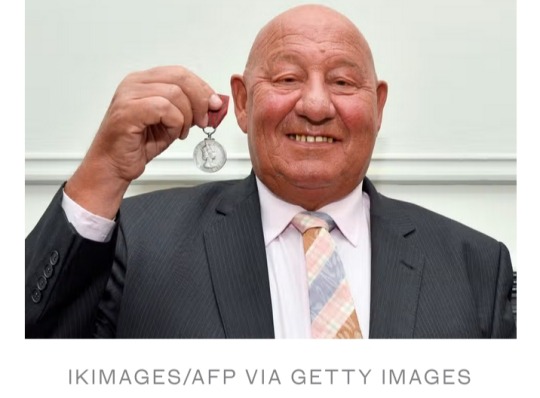
#Princess Anne#Princess Royal#Queen Elizabeth II#Captain Mark Phillips#British Royal Family#Ian Ball#Inspector James Beaton#Day of the Jackal#Buckingham Palace#Sandhurst#Riding Towards Freedom#Riding for the Disabled#Rowena Jane Brassey#Walther PPK#Alexander Callender#Michael Parkinson#Brian McConnell#Ronnie Russell#Repton Club#Constable Michael Hills#Detective Constable Peter Edmonds#The Mall#St James’s Park#schizophrenia#Broadmoor Hospital#George Cross
52 notes
·
View notes
Text
Brainstorming-
Mkay I have several ideas for alien/human posts so I'm putting them here before I forget. If this gets popular maybe I'll actually write some lol
Songs/singing : sounds being very powerful w/ other species; the most severe (?) sounds you'll find are soft clicks/rumbling and most languages developed through touch / what we'd call sign language. So these species are mesmerized by human singing cause they either can't do it / don't have enough control over the pitch of their voice or they "hear" by feeling vibrations and process tones differently.
This has endless possibilities- a human singing softly while working and causing some extreme reaction in the mechanics of the ship or their crewmates, humans taking over ships by accessing the intercom system, humans knowing the first thing to do if they're kidnapped is to yell at a really low pitch then a really high one cause chances are one of them will do something, videos of humans harmonizing becoming really popular (and being banned in several galaxies), two humans realizing they both know a song with a harmony and proceeding to sing it (causing everyone on the ship to stop what they're doing and just listen in awe), sign language becoming the main form of communication and ships having soundproof rooms so humans can talk to each other / themselves...
Species variation : most species didn't figure out efficient space travel for millions of years. Pair that with gene editing (to get rid of "imperfections"- usually this portion of the species' history is their "dark age"), and each individual looks pretty much identical. Most species have some sort of fetishized/slur word for individuals with any kind of abnormality, cause they're really really rare at this point. Think crocodiles; maybe some color variations but they've stayed more or less the same for millions of years. But humans? No two look the same- except maybe identical twins, but they could have different haircuts (don't even get me started on body modifications- other species do it, sure, but humans are already so different that it makes them a nightmare to teach about.) And in space the beauty standards are all over the place so if you want tattooed stripes you can get them- but wait, aren't there already some humans with stripes? And pointed ears? Dyed hair?
There's also the constant battle between human willpower and circumstance. When other species carefully figure out how to turn and move around an obstacle, humans are literally slingshotting themselves off of it. But for every death-defying feat, there are God knows how many feat-defying deaths. One human got an adrenaline rush and lifted an entire gnarflax. Another fainted 'cause they stood up too fast. Most species have clearly defined limits, so there's no pressure to push past them.
And mimicry : As if humans' vocal range isn't enough (what's that clicking? Sounds like a xhrhghfnl from my home planet- nope, it's John. Machinery malfunctioning? Alarms? Nope. F***ing John.), they can also make disguises and act. See, most species can manipulate the holograms or whatever but there's no way they'd be able to do convincing impressions in real time. Just going for it? Completely irrational.
One time, a human even convinced an entire rhusngi fleet that she was a rhusngi inspector "in disguise". (Honestly that line should've given it away but it walked and moved with the same mannerisms- the same- I don't even know. We were completely- what's that human expression?- shook.)
Not knowing what someone's going/been through unless they tell you is a completely novel concept. Imagine a human acting all violent when you take over their ship so you put 'em in the brig somehow, only to pull up the camera feed later and see them sobbing or completely frozen in a fetal position, or even worse- hurting themselves somehow. But the second you go down there, they're spitting curses at you and showing zero signs of weakness.
If anyone wants to write about these pls go right ahead. Sorry if they've already been done/overused (if they have, please lmk so I can go read them).
#humans are space orcs#humans are weird#humans are space australians#humans and aliens#random ideas#brainstorm
115 notes
·
View notes